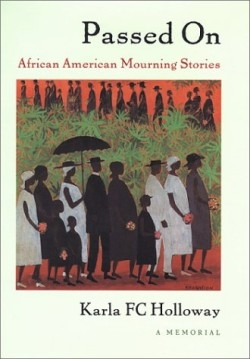Passed On
African American Mourning Stories
Black folk died in mournful collectives and in disconcerting circumstances. We died in riots and rebellions, as victims of lynching, from executions, murders, police violence, suicides, and untreated or undertreated diseases…the story of how we died shaped a tragic community narrative.
So begins an early chapter of this engaging and, at times, heartbreaking, study of death in African American culture. Whether discussing the business of burying the dead, how they died, persistent rumors surrounding the deaths, or the form of African American funerals, the author is always concerned with the cultural work of these narratives and the way they give shape and strength to the community.
Holloway, Dean of Humanities and Social Sciences at Duke University and author of Mooring and Metaphors: Culture and Gender in Black Women’s Literature, is at her best early in the book, in the chapter called “Who’s Got the Body?” Here she examines the business of burial. It is well known that the funeral home business has remained segregated, primarily by choice and custom, long after Brown vs. Topeka, Kansas Board of Education. African Americans usually patronize black-owned mortuaries and whites patronize their own as well. Holloway offers a more complete understanding of how and when this came to be, and the ways in which the division has begun to crumble in recent years, much to the dismay of many black business owners.
Holloway is weakest when she recounts the circumstances of African American deaths. Despite the power of her language in this chapter, here she mainly treads well-traveled ground, recounting stories and events that have received wide, and better, coverage elsewhere—statistics about lynching, the death of Emmett Till, the story of the immoral experimentation on African Americans with syphilis in Tuskegee, Alabama, etc.
If Holloway sometimes errs by restating the well known, she nevertheless has managed to elucidate an aspect of African American culture that has far-reaching consequences. By framing her study on the one end with the story of her own adopted son’s death during an attempted prison break, and on the other with the funeral sermon delivered for her son, she demonstrates how cultural and academic criticism can, and should, have a personal effect, both for those who write it and for those who read it. It is a lesson she learned well from W.E.B. Du Bois.
Disclosure: This article is not an endorsement, but a review. The publisher of this book provided free copies of the book to have their book reviewed by a professional reviewer. No fee was paid by the publisher for this review. Foreword Reviews only recommends books that we love. Foreword Magazine, Inc. is disclosing this in accordance with the Federal Trade Commission’s 16 CFR, Part 255.

